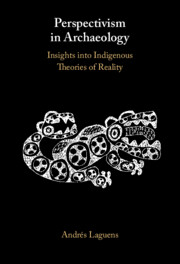Book contents
- Perspectivism in Archaeology
- Perspectivism in Archaeology
- Copyright page
- Dedication
- Contents
- Figures
- Foreword
- Preface
- Acknowledgements
- Abbreviations
- 1 Perspectivism
- 2 Perspectivism as a Theory
- 3 Perspectivism, Materials and Objects
- 4 A Perspectivist Approach to the Archaeology of Ambato
- 5 Pot-Persons in Ambato
- 6 Inhabiting a Perspectivist World
- 7 Perspectivism and Archaeology
- References
- Index
4 - A Perspectivist Approach to the Archaeology of Ambato
Published online by Cambridge University Press: 01 February 2024
- Perspectivism in Archaeology
- Perspectivism in Archaeology
- Copyright page
- Dedication
- Contents
- Figures
- Foreword
- Preface
- Acknowledgements
- Abbreviations
- 1 Perspectivism
- 2 Perspectivism as a Theory
- 3 Perspectivism, Materials and Objects
- 4 A Perspectivist Approach to the Archaeology of Ambato
- 5 Pot-Persons in Ambato
- 6 Inhabiting a Perspectivist World
- 7 Perspectivism and Archaeology
- References
- Index
Summary
Chapter 4 tests the theory through a perspectivist approach to the archaeological record of an Andean society of northern Argentina, the Aguada culture (600–1100 CE). The analysis focuses on the relationships of humans with animals, both domestic and wild, and with a particular class of ceramic objects from Aguada society. The evidence points to modes of relationship that bring into play constructions of otherness and an understanding of the world that accords with a perspectivist ontology. The capacity for transformation of animals and people expressed in ambiguous figures of wild felines and humans reinforces the idea of an unstable world where all is subject to movement, change and metamorphosis. In particular, the relationship between humans and domestic animals, especially the llama, is analysed in domestic contexts and cave paintings. An object-centred case study analyses ceramic models of human and animal heads and bodies made analogously; again, they are treated equally and include human attributes as if they were all entities of the same class. The ceramic evidence further supports the possibility that other species may also have been considered endowed with subjectivity, that is, non-human persons.
- Type
- Chapter
- Information
- Perspectivism in ArchaeologyInsights into Indigenous Theories of Reality, pp. 87 - 119Publisher: Cambridge University PressPrint publication year: 2024

